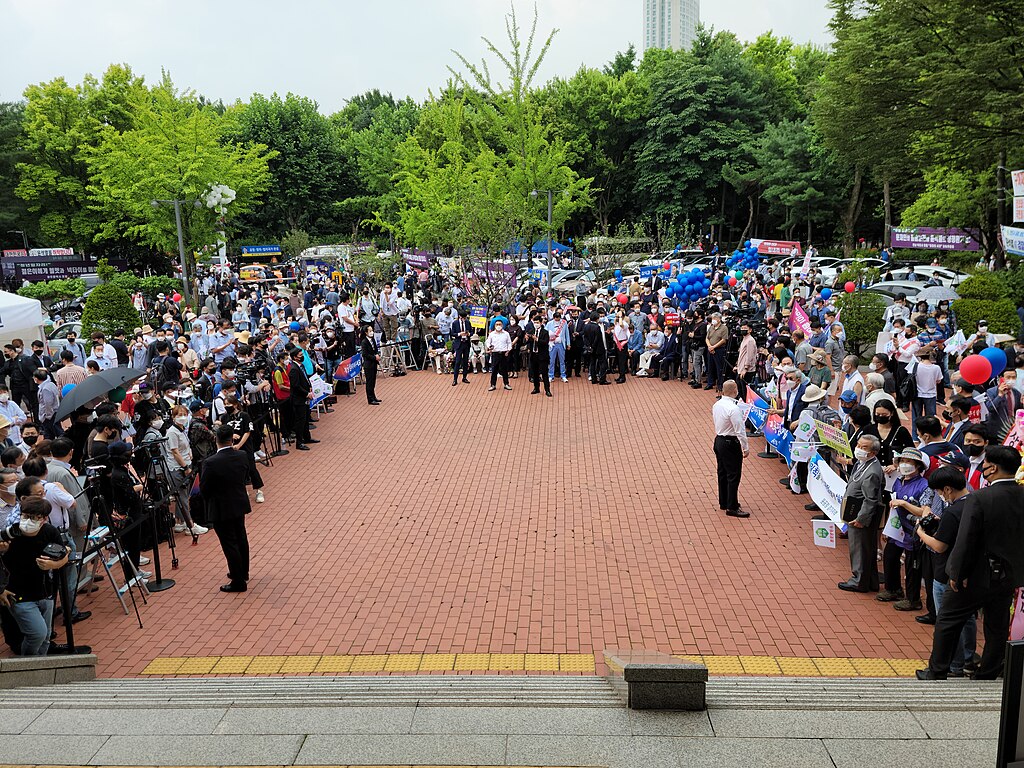South Korea’s impeached President Yoon Suk Yeol refused questioning on Monday in an investigation into alleged insurrection. Authorities have increased security at the Seoul Detention Centre, where Yoon is held, and the Constitutional Court, which is conducting his impeachment trial. Yoon, arrested last week over his brief December 3 martial law declaration, is the first sitting South Korean president to face arrest.
On Sunday, Yoon was formally detained after a court approved his arrest, citing risks of evidence destruction. Hours later, angry supporters stormed the Seoul Western District Court, damaging property and overpowering police using broken barricades. Authorities plan to arrest 66 individuals involved in trespass, obstruction, and assault, with further offenders under investigation. Acting Justice Minister Kim Seok-woo assured legal action against all violators.
Acting President Choi Sang-mok condemned the violence and urged strict law enforcement to prevent further incidents. The protests saw hundreds of demonstrators, some using fire extinguishers, breach court security. Video footage captured intrusions into judges’ offices and live-streamed acts of vandalism, with some streamers detained during their broadcasts.
Yoon, who has repeatedly refused to cooperate with the Corruption Investigation Office for High-ranking Officials (CIO), argues his arrest and the warrant’s jurisdiction are illegal. His lawyers challenge the CIO’s authority to lead the probe.
Insurrection, a charge exempt from presidential immunity and punishable by death, is at the center of Yoon’s case. South Korea has not carried out executions in nearly 30 years. Through his lawyers, Yoon called Sunday’s violence “shocking,” urging supporters to remain peaceful while expressing their frustrations. He requested police tolerance toward public grievances.
This unprecedented case highlights South Korea’s political and social divisions, with significant implications for its democratic processes.



 Minnesota Judge Rejects Bid to Halt Trump Immigration Enforcement in Minneapolis
Minnesota Judge Rejects Bid to Halt Trump Immigration Enforcement in Minneapolis  Trump Lifts 25% Tariff on Indian Goods in Strategic U.S.–India Trade and Energy Deal
Trump Lifts 25% Tariff on Indian Goods in Strategic U.S.–India Trade and Energy Deal  Trump Backs Nexstar–Tegna Merger Amid Shifting U.S. Media Landscape
Trump Backs Nexstar–Tegna Merger Amid Shifting U.S. Media Landscape  Missouri Judge Dismisses Lawsuit Challenging Starbucks’ Diversity and Inclusion Policies
Missouri Judge Dismisses Lawsuit Challenging Starbucks’ Diversity and Inclusion Policies  US Pushes Ukraine-Russia Peace Talks Before Summer Amid Escalating Attacks
US Pushes Ukraine-Russia Peace Talks Before Summer Amid Escalating Attacks  Trump Lawsuit Against JPMorgan Signals Rising Tensions Between Wall Street and the White House
Trump Lawsuit Against JPMorgan Signals Rising Tensions Between Wall Street and the White House  Trump Signs “America First Arms Transfer Strategy” to Prioritize U.S. Weapons Sales
Trump Signs “America First Arms Transfer Strategy” to Prioritize U.S. Weapons Sales  India–U.S. Interim Trade Pact Cuts Auto Tariffs but Leaves Tesla Out
India–U.S. Interim Trade Pact Cuts Auto Tariffs but Leaves Tesla Out  US Judge Rejects $2.36B Penalty Bid Against Google in Privacy Data Case
US Judge Rejects $2.36B Penalty Bid Against Google in Privacy Data Case  New York Judge Orders Redrawing of GOP-Held Congressional District
New York Judge Orders Redrawing of GOP-Held Congressional District  Trump Family Files $10 Billion Lawsuit Over IRS Tax Disclosure
Trump Family Files $10 Billion Lawsuit Over IRS Tax Disclosure  Supreme Court Signals Skepticism Toward Hawaii Handgun Carry Law
Supreme Court Signals Skepticism Toward Hawaii Handgun Carry Law  TrumpRx Website Launches to Offer Discounted Prescription Drugs for Cash-Paying Americans
TrumpRx Website Launches to Offer Discounted Prescription Drugs for Cash-Paying Americans  Newly Released DOJ Epstein Files Expose High-Profile Connections Across Politics and Business
Newly Released DOJ Epstein Files Expose High-Profile Connections Across Politics and Business  Google Halts UK YouTube TV Measurement Service After Legal Action
Google Halts UK YouTube TV Measurement Service After Legal Action  Trump Says “Very Good Talks” Underway on Russia-Ukraine War as Peace Efforts Continue
Trump Says “Very Good Talks” Underway on Russia-Ukraine War as Peace Efforts Continue  Trump Administration Sued Over Suspension of Critical Hudson River Tunnel Funding
Trump Administration Sued Over Suspension of Critical Hudson River Tunnel Funding 































